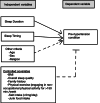Do Sleep Time and Duration Affect the Development of Prehypertension in Undergraduate Medical Students? An Experience from a Tertiary Care Hospital in Kolkata
- PMID: 40292203
- PMCID: PMC12020568
- DOI: 10.1055/s-0044-1787838
Do Sleep Time and Duration Affect the Development of Prehypertension in Undergraduate Medical Students? An Experience from a Tertiary Care Hospital in Kolkata
Abstract
Introduction and Objective Hypertension is an evolving public health challenge at present, and it is preceded by a prehypertensive stage. Irregular sleep duration and pattern have been found to be linked with cardiovascular diseases. Medical students are highly vulnerable to low quality sleep due to pressure regarding the academic curriculum and poor lifestyle. The present study aimed to estimate the prevalence of prehypertension, describe the risk factors and sleep patterns of undergraduate medical students, and determine the association, if any, involving sleep time and duration and prehypertension. Materials and Methods Data was collected from 254 undergraduate medical students via the Pittsburgh Sleep Quality Index (PSQI) questionnaire and a self-structured questionnaire. The frequency of events was established and the Chi-squared and t -tests were applied to determine the association. Finally, regression analysis was performed to determine the correlation. Results Male sex, high body mass index (BMI), poor sleep quality, and night sleep duration shorter than 5 hours were found to be significant risk factors for the development of prehypertensive condition (prevalence of 42.5%). However, there were no statistically significant associations regarding prehypertension and family history, junk food and salt intake, physical activity and daytime napping, bedtime, and wake-up time. Night sleep duration shorter than 5 hours presented an odds ratio of 4.713 ( p = 0.010) for the development of prehypertension after adjusting for other risk factors, such as male sex, sleep quality, and high BMI. Discussion and Conclusion A high prevalence of prehypertension (42.5%) was noted among undergraduate medical students. Night sleep duration shorter than 5 hours was a significant risk factor for the development of prehypertension, whereas sleep time was not significantly associated with prehypertension.
Keywords: Kolkata; prehypertension; sleep duration; sleep time; undergraduate medical student.
Brazilian Sleep Academy. This is an open access article published by Thieme under the terms of the Creative Commons Attribution-NonDerivative-NonCommercial License, permitting copying and reproduction so long as the original work is given appropriate credit. Contents may not be used for commercial purposes, or adapted, remixed, transformed or built upon. ( https://creativecommons.org/licenses/by-nc-nd/4.0/ ).
Figures



Similar articles
-
Prevalence and risk factors of prehypertension in university students in Sabah, Borneo Island of East Malaysia.Medicine (Baltimore). 2020 May 22;99(21):e20287. doi: 10.1097/MD.0000000000020287. Medicine (Baltimore). 2020. PMID: 32481309 Free PMC article.
-
Night eating syndrome and its association with weight status, physical activity, eating habits, smoking status, and sleep patterns among college students.Eat Weight Disord. 2017 Sep;22(3):421-433. doi: 10.1007/s40519-017-0403-z. Epub 2017 Jun 2. Eat Weight Disord. 2017. PMID: 28573425
-
Impact of Sleep Duration, Quality, and Chronotype on Learning and Academic Performance: A Cross-Sectional Study Among First Year Medical Students of a Tertiary Care Institute.Cureus. 2023 Dec 12;15(12):e50413. doi: 10.7759/cureus.50413. eCollection 2023 Dec. Cureus. 2023. PMID: 38222241 Free PMC article.
-
Associations of short sleep duration with prehypertension and hypertension among Lithuanian children and adolescents: a cross-sectional study.BMC Public Health. 2014 Mar 15;14:255. doi: 10.1186/1471-2458-14-255. BMC Public Health. 2014. PMID: 24628980 Free PMC article.
-
Epidemiology of sleep disturbances among medical students in the Middle East and North Africa: a systematic review and meta-analysis.J Glob Health. 2025 Apr 25;15:04099. doi: 10.7189/jogh.15.04099. J Glob Health. 2025. PMID: 40277296 Free PMC article.
References
-
- National Heart Lung and Blood Institute . Bethesda: National Institutes of Health; 2004. The seventh report of the joint national committee on prevention, detection, evaluation, and treatment of high blood pressure. - PubMed
-
- Lopez A D, Mathers C D, Ezzati M, Jamison D T, Murray C J. Global and regional burden of disease and risk factors, 2001: systematic analysis of population health data. Lancet. 2006;367(9524):1747–1757. - PubMed
-
- Chaput J P, Dutil C, Featherstone Ret al.Sleep duration and health in adults: an overview of systematic reviews Appl Physiol Nutr Metab 202045(10 (Suppl. 2)):S218–S231. - PubMed
LinkOut - more resources
Full Text Sources

